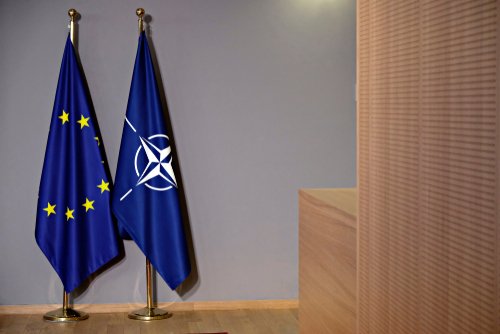Brussels (Brussels Morning) This week, the European Parliament convenes committee meetings to discuss and vote on matters related to NATO cooperation — with Secretary-General Jens Stoltenberg —, COVID-19 vaccines and variants, the GDPR application, artificial intelligence in the culture sector, disinformation and its impact on democracies, and, along with European Central Bank President Christine Lagarde, the state of the Eurozone.
NATO
On Monday, MEPs will discuss NATO cooperation and how to jointly respond to security challenges. The Parliament is expected to address opportunities for closer cooperation between the EU and NATO on military mobility, the fight against hybrid threats and the use of disruptive and emerging technologies.
MEPs will also assess how the allies can work together in a more interconnected manner, to avoid unilateral initiatives that may threaten the security of allied partners.
COVID-19 vaccines
Also on Monday, the Environment, Public Health and Food Security Committee holds a debate on COVID-19 variants and how effective vaccines are against these mutations. Representatives from the European Medicine Agency, the European Centre for Disease Prevention and Control and the World Health Organisation will answer MEPs’ questions on the safety and efficacy of the inoculations.
The Commission will use the occasion to unveil the HERA Incubator, an EU plan to monitor variants, exchange data and cooperate on adapting vaccines.
GDPR
On Tuesday, the Civil Liberties Committee will look into possible changes and improvements that could be made, two years after the introduction of the General Data Protection Regulation. MEPs have been voicing their concerns about data protection issues, especially with regard to efforts by authorities seeking to curtail the work of journalists and NGOs.
Parliament has also cited the lack of resources for supervisory and monitoring authorities and procedures against EU countries not meeting their obligations.
Artificial Intelligence
The impact of artificial intelligence technologies on culture, education and audio-visual sectors is to be assessed by MEPs from the Culture and Education Committee on Tuesday. Parliament is likely to ask for a general framework to regulate algorithms recommending content, for instance, to manage their impact on cultural diversity. Issues to be addressed include fake news and deepfakes as well as the need to ensure an adequate skills capacity to cope with an AI-driven labour market.
Disinformation
On Wednesday, the Parliament’s press service will hold a seminar on the disinformation dilemma and how to respond and regulate the problem without undermining democracy. Lead MEPs and experts on the subject will discuss how disinformation is undermining trust in democracies on both sides of the Atlantic.
Monetary Policy
The state of the Eurozone will be debated on Thursday, led by the Economic and Monetary Affairs Committee. European Central Bank (ECB) President Christine Lagarde will take part as MEPs assess how monetary policy should be revised in the face of the economic effects of the pandemic. In anticipating possible national financial setbacks, Parliament is set to question the ECB on the danger posed by not having adequate recovery plans in place when the current exceptional monetary financing measures wind down.




